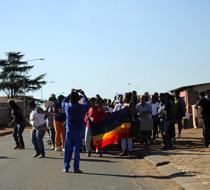Queer vernaculars and visual narratives IRANTI Favorite
ONGOING ORGANIZATION:
CALLED: Iranti [pronounced írantì] is the Yoruba word for ‘memory’. Largely found in South West Nigeria and parts of Benin Republic, the Yoruba people consider memory a prized form of intelligence which determines how often one remembers what they see and hear.
Iranti is a queer human rights visual media organization based in Johannesburg, South Africa. Iranti works within a human rights framework as its foundational platform for raising issues on Gender, Identities and Sexuality. Founded in January 2012 by Human Rights activist, photographer and curator, Jabu Pereira is formed with the clear intention of building local partnerships and movements that use media as a key platform for lobbying, advocacy and educational interventions across Africa. Through the use of various visual mediums such as videos, photography, audio recording, among others sets itself as an archive of Queer memory in ways that destabilize numerous modes of discrimination based on gender, sexuality and sexual orientation.
Through such multi-media approaches documents issues related to gender and gender identification; sexuality and sexual orientation within varied contexts in South Africa and on the continent. Most importantly seeks to find local vernaculars that tell the stories of vulnerable persons simultaneously alongside and outside International Human Rights universalisms. Iranti works with rural and urban populations in South Africa and the region as part of its engagement with civil society at different levels. As a Queer Visual Media Non-Governmental Organisation seeks to document the lives of Queer Africans and Africa-based persons with the intention of building visual narrative evidence, creating awareness and influencing the making of policies and laws that advance Human Rights across South Africa and beyond.
Vision and approach
Iranti believes that all human beings have the right to enjoy and celebrate a life of economic, social and political freedom underpinned by dignity and respect.
Lesbian, Gay, Bisexual, Trandgender and Intersex (LGBTI) persons in Africa experience gross human rights violations. Such violations and abuses include prohibitions against the right to organize, freedom of association, discrimination on basis of sexual identity, denial of access to state services such as health care, education, employment and housing.
Within such an understanding therefore:
We work at advancing human rights based on sexual orientation and gender identity at a regional level.
We promote international human rights norms and standards by documenting the failures of African governments to meet these standards.
We train LGBTI human rights defenders to document in their respective contexts and thus amplifying the voices of LGBTI activists as a collective.
We monitor, document and report on human rights violations by community members, service providers and government agents in the region.
We use visual arts as an important platform for Iranti’s education and dialogue.
Objectives and activities
To strengthen capacity in the LGBTI movement and civil society within the region.
To build strategies for advocacy and human rights documentation
To create a platform for the use of arts as a tool for activism
To report on human rights violations and gains through news correspondents across Africa.
Focus areas
Documentation and reporting on human rights violations and human rights gains.
Fostering collaboration and movement-building for the advancement of human rights regionally.
Developing training programmes and resources to strengthen local and regional movements
Key achievements
Since its establishment in January 2012 has documented hate crime attacks and murders within South Africa. Iranti has worked closely with LGBTI groups in building an effective national campaign against hate crimes and violence.
In the past few months, we have, between June and July 2012,
documented the murders of:
Thapelo Makhutle a 24 year-old gay man from Kuruman, Northern Cape
Andritha Thapelo Morifi, a 29 year-old lesbian from Mokopane, Limpopo
Sanna Supa, a 34 year-old lesbian from Soweto, Gauteng
In July 2012, in collaboration with FEW (Forum for the Empowerment of Women) developed a national action plan calling for an end to the silence by the South African Government on hate crimes and violence.
On the 18th July 2012 in collaboration with FEW, other national LGBTI groups and individual activists mobilized a national protest against the government’s silence on hate crimes and violence against LGBTI persons. Dubbed 67 Minutes of Shame this protest was framed within the 67 minutes devoted to acts of goodwill in honour of Nelson Mandela as South Africa’s freedom and equality icon.
Recently, in collaboration with TIA (Transgender Intersex Africa) and OSISA (Open Society Initiative Southern Africa) was involvement in the first workshop of its kind on gender identities and sexuality with Beyond Identities –a Soweto-based group for young lesbians.
Role and impact
In the coming months we will continue to meet with key government and political leaders. On the 8th August, together with FEW Iranti will meet with the ANC Secretary General, Gwede Mantashe to discuss a memorandum submitted to the party by various LGBTI organizations on proposed action against hate crimes and violence.
Through the intervention of Iranti and allied organizations, South Africa’s Deputy President, Kgalema Mothlante and his Director-General have agreed to call a meeting of director generals nationally to discuss sexual orientation and hate crimes within government programmes.http://www.iranti-org.co.za/









